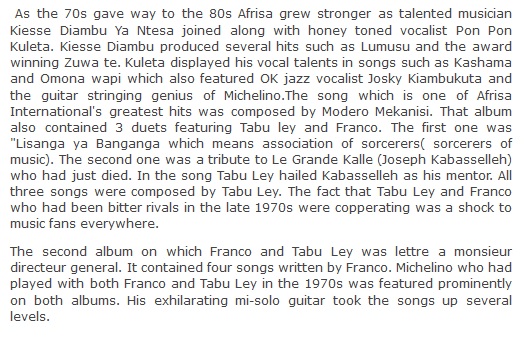
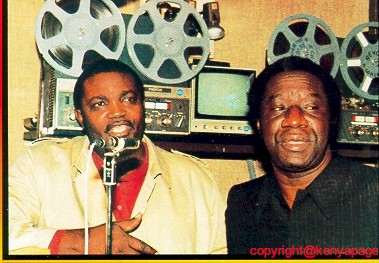
Franco and Rochereau in a Paris studio during the recording of their historic cooperation
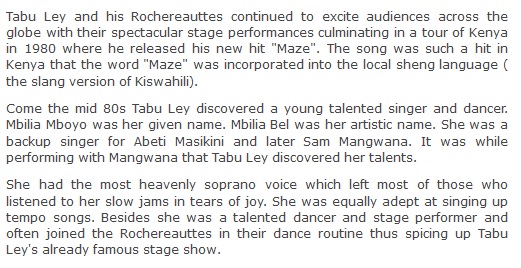
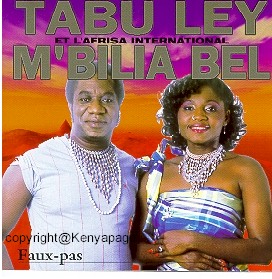
Tabu and Mbilia were a formidable duo
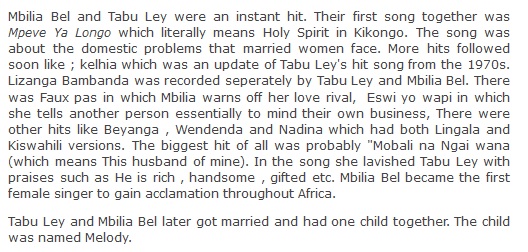
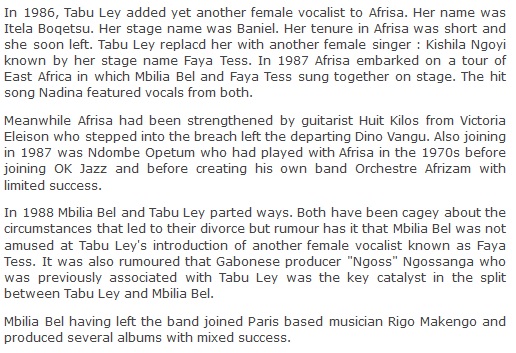



Franco and Rochereau in a Paris studio during the recording of their historic cooperation


Tabu and Mbilia were a formidable duo



As the 70s gave way to the 80s Afrisa grew stronger as talented musician Kiesse Diambu Ya Ntesa joined along with honey toned vocalist Pon Pon Kuleta. Kiesse Diambu produced several hits such as Lumusu and the award winning Zuwa te. Kuleta displayed his vocal talents in songs such as Kashama and Omona wapi which also featured OK jazz vocalist Josky Kiambukuta and the guitar stringing genius of Michelino.The song which is one of Afrisa International's greatest hits was composed by Modero Mekanisi. That album also contained 3 duets featuring Tabu ley and Franco. The first one was "Lisanga ya Banganga which means association of sorcerers( sorcerers of music). The second one was a tribute to Le Grande Kalle (Joseph Kabasselleh) who had just died. In the song Tabu Ley hailed Kabasselleh as his mentor. All three songs were composed by Tabu Ley. The fact that Tabu Ley and Franco who had been bitter rivals in the late 1970s were copperating was a shock to music fans everywhere. The second album on which Franco and Tabu Ley was lettre a monsieur directeur general. It contained four songs written by Franco. Michelino who had played with both Franco and Tabu Ley in the 1970s was featured prominently on both albums. His exhilarating mi-solo guitar took the songs up several levels. Franco and Rochereau in a Paris studio during the recording of their historic cooperation Tabu Ley and his Rochereauttes continued to excite audiences across the globe with their spectacular stage performances culminating in a tour of Kenya in 1980 where he released his new hit "Maze". The song was such a hit in Kenya that the word "Maze" was incorporated into the local sheng language ( the slang version of Kiswahili). Come the mid 80s Tabu Ley discovered a young talented singer and dancer. Mbilia Mboyo was her given name. Mbilia Bel was her artistic name. She was a backup singer for Abeti Masikini and later Sam Mangwana. It was while performing with Mangwana that Tabu Ley discovered her talents. She had the most heavenly soprano voice which left most of those who listened to her slow jams in tears of joy. She was equally adept at singing up tempo songs. Besides she was a talented dancer and stage performer and often joined the Rochereauttes in their dance routine thus spicing up Tabu Ley's already famous stage show. Mbilia Bel and Tabu Ley were an instant hit. Their first song together was Mpeve Ya Longo which literally means Holy Spirit in Kikongo. The song was about the domestic problems that married women face. More hits followed soon like ; kelhia which was an update of Tabu Ley's hit song from the 1970s. Lizanga Bambanda was recorded seperately by Tabu Ley and Mbilia Bel. There was Faux pas in which Mbilia warns off her love rival, Eswi yo wapi in which she tells another person essentially to mind their own business, There were other hits like Beyanga , Wendenda and Nadina which had both Lingala and Kiswahili versions. The biggest hit of all was probably "Mobali na Ngai wana (which means This husband of mine). In the song she lavished Tabu Ley with praises such as He is rich , handsome , gifted etc. Mbilia Bel became the first female singer to gain acclamation throughout Africa. Tabu Ley and Mbilia Bel later got married and had one child together. The child was named Melody. In 1986, Tabu Ley added yet another female vocalist to Afrisa. Her name was Itela Boqetsu. Her stage name was Baniel. Her tenure in Afrisa was short and she soon left. Tabu Ley replacd her with another female singer : Kishila Ngoyi known by her stage name Faya Tess. In 1987 Afrisa embarked on a tour of East Africa in which Mbilia Bel and Faya Tess sung together on stage. The hit song Nadina featured vocals from both. Meanwhile Afrisa had been strengthened by guitarist Huit Kilos from Victoria Eleison who stepped into the breach left the departing Dino Vangu. Also joining in 1987 was Ndombe Opetum who had played with Afrisa in the 1970s before joining OK Jazz and before creating his own band Orchestre Afrizam with limited success. In 1988 Mbilia Bel and Tabu Ley parted ways. Both have been cagey about the circumstances that led to their divorce but rumour has it that Mbilia Bel was not amused at Tabu Ley's introduction of another female vocalist known as Faya Tess. It was also rumoured that Gabonese producer "Ngoss" Ngossanga who was previously associated with Tabu Ley was the key catalyst in the split between Tabu Ley and Mbilia Bel. Mbilia Bel having left the band joined Paris based musician Rigo Makengo and produced several albums with mixed success. The rest of the Afrisa band including Kuleta and Modero were equally prolific in their productions such as Amilo and Sanza Misato Among others. (too bad I have never found these songs on CD). The band received a huge blow in the early 80s when Kiesse Diambu Defected over to TPOK Jazz to Join his brother Ntessa Dalienst. In 1985 when the Government of Kenya banned all foreign music from the National Radio service, Tabu Ley composed a song in praise of the president and the ban was lifted promptly. Yet another stroke of genius from Tabu Ley. After Mbilia Bel's departure however Afrisa's influence along with that of their rivals TPOK Jazz continued to wane as fans gravitated toward the faster more diluted version of Soukous which only features the Sebene section. Tabu Ley continues to perform today.He has remained faithful to the version of Soukous which he invented. This version features 3 parts. A slower introductory part which builds up to a mid tempo harmony building section and finally to the searing release of the sebene .